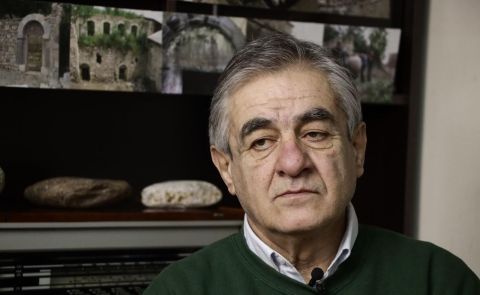
Catalina de la Sota: Bringing the Case of Karabakh Armenians to the International Criminal Court

On 19 September 2024, Zimeray & Finelle Associates in Paris submitted a communication to the Prosecutor of the International Criminal Court on behalf of two victims, Artak Beglaryan and Gegham Stepanyan.
Both plaintiffs have a history of human rights advocacy and have held public responsibilities in the self-proclaimed Republic of Nagorno-Karabakh. The region, which for decades functioned as a de facto autonomous territory, came under Azerbaijani control in the autumn of 2023, resulting in the evacuation of its 100,000-strong Armenian population. This case seeks to establish that the exodus which occurred in September 2023 was forced and constitutes a crime against humanity.
Through this case, individual Armenian refugees are seeking justice. Should an investigation be opened by the ICC, the Prosecutor will seek to assign individual responsibility to Azerbaijani officials, rather than to the state of Azerbaijan. Azerbaijan is not on trial, and Armenia is not the plaintiff, yet there remains a standoff of national significance. To better understand this legal action, Caucasus Watch speaks with Catalina de la Sota, one of the lawyers representing the two plaintiffs.
On September 19 your firm, Zimeray & Finelle, filed a case with the Prosecutor of the International Criminal Court (ICC) on behalf of two plaintiffs, Artak Beglaryan and Gegham Stepanyan. Is this a case put forward by two people or by “a people”?
We have filed this complaint on behalf of two victims, Artak Beglaryan and Gegham Stepanyan. The submission is based on their personal stories, on what they suffered during the Karabakh blockade, how they were forced to leave their homes, and how they became refugees. Of course, their two stories are also representative of the suffering of the more than 100,000 people who were forcibly displaced. In sum, the submission concerns two victims, whose cases are highly symbolic and representative of the experience of the wider displaced population. The case now is in the hands of the Prosecutor of the International Criminal Court. If the Prosecutor does open an investigation, then a broad investigation would be open with the possibility for any victim of enforced displacement from Nagorno-Karabakh to participate.
Given that Azerbaijan is not a party to the Rome Statute establishing the ICC, what is the relevance of this case? Also, could you clarify an issue for me please: is this a complaint against a state, Azerbaijan, or is this a complaint by individual victims against individual perpetrators of specific crimes.
The ICC does not judge states. It rules on the criminal responsibility of individuals. It is important not to confuse the International Criminal Court with the International Court of Justice.
The International Court of Justice rules on disputes between two sovereign states. The International Criminal Court looks into criminal liability of individuals for the commission of crimes specified in the Rome Statute. So, we are not taking steps against a state but bringing crimes to the attention of the ICC Prosecutor so that criminal responsibilities are identified. The individuals responsible may very well be high ranking civil servants, officers, or soldiers of Azerbaijan. But not the state of Azerbaijan.
Now, it is legitimate to ask how Azerbaijan, which is not a party to the Rome Statute, would see its citizens tried by the ICC. While Armenia is a recent party to the Rome Statute, having formally joined in February 2024, Azerbaijan is not a party.
However, the ICC caselaw is clear on this point. I am referring to the Myanmar/Bangladesh case. In that particular case, the ICC ruling stipulates in very clear terms that when one of the crimes specified in the Rome Statute has partly been committed on the territory of a state party, it falls under the jurisdiction of the court. And in this case, part of the criminal conduct occurred in the state of the Republic of Armenia, who is a member of the Rome Statute. Because the criminal behaviour here is the deportation of a population from one territory to another, this case is directly equivalent, and the precedent applies.
To summarise: the events that unfolded took part in territory internationally recognized as part of Azerbaijan but evolved in Armenia as the refugees moved there to seek protection. That is what you argue is the “continuation of the criminal offence.” However, Armenia only became a signatory to the Rome Statute in February 2024. Can this membership have a retroactive effect on the competence of the Court?
Yes, because when the Republic of Armenia adopted its law ratifying the
Rome Statute, the legislator introduced a provision for the ICC to have jurisdiction retroactively from 10 May 2021 over the crimes of genocide, war crimes, and crimes against humanity. Therefore, the ICC has jurisdiction for the crime of deportation -which is a crime against humanity - in September 2023 from Nagorno-Karabakh.
Should your clients have their day in Court, you will introduce evidence. Part of this evidence will be the testimonies of your plaintiffs. Are they testifying as leaders of a political entity or as civilian plaintiffs? Overall, without compromising the substance of your case, are you able to discuss the scope of your evidence and how you plan to address questions relating to chain of custody (or how you guarantee the integrity of evidence)?
Let me address these questions separately. First, it is clear that the plaintiffs we represent will be testifying as civilian victims, not in their capacity of former members of the institutions of Nagorno-Karabakh. They are civilian victims, like any other civilian victim.
As for your second question regarding the scope of evidence, I am not in a position to respond at this stage.
The overwhelming majority if not everyone who left Nagorno-Karabakh sought refuge in Armenia, at least at an early stage. That is fundamental to your case. Most were Armenian citizens. Further down the line, to what extend will a prosecutor require the cooperation of Armenia, beyond opening the legal window that enables ICC jurisdiction.
That is not a question we can address. If the ICC needs the assistance of victims, we as representatives of some of them can submit additional evidence. However, I cannot comment on the requests the Republic of Armenia might receive from the Court.
At the risk of a certain overlap with my previous question: your plaintiffs are former officials. Assuming they have their day in Court, what do you hope to achieve for your clients? What is the time frame for a process of the kind? Are you and your clients confident that it is the ICC courtroom the right place to seek justice?
Let me separate this question into its three distinct ones. Let's start with the time frame. We have filed is what is called ‘a communication’ to the ICC Prosecutor, based on Article 15 of the Rome Statute. This article stipulates that any victim bring evidence to the Prosecutor. The Prosecutor may then open on his or her own initiative an investigation based on this initial information. To do so however, the Prosecutor needs to request an authorization from the Pre-Trial Chamber. So, we have submitted our communication, and the Prosecutor will analyse the seriousness of the information provided. Should he think there is a reasonable basis to proceed, he would go to the pre-Trial Chamber and request permission to open an investigation. As such, it is difficult to answer regarding the time frame. It is not in our hands and the Rome Statute does not provide for deadlines.
What is certain is that the ICC is extremely busy at this time, handling difficult and sensitive cases. Unfortunately, the crimes committed in Nagorno-Karabakh were sparsely reported and went largely unnoticed. They did not make the headlines. It is hence fundamental to highlight the gravity of the situation to the Court’s Prosecutor. What has happened one year ago is a crime against humanity. We must talk about it, and an investigation should be opened.
Moving on to what we hope to achieve. The opening of an investigation and ultimately a trial on what happened are important. The events in Nagorno-Karabakh went, as I said, largely unnoticed. Victims before the ICC can request for reparations. Reparations can come under the form of a monetary compensation, the restitution of property, or be more symbolic in nature, like an apology, or the construction of a memorial.
As for the last question, whether a court is the correct forum to seek justice. You are asking a lawyer, of course my answer is that the ICC is the right forum. International justice is fundamental, and in this particular case the ICC is best placed to investigate this crime of deportation. No Azerbaijani Court will prosecute the perpetrators of the crimes against Nagorno-Karabakh Armenians. The victims of deportation from Nagorno-Karabakh have a right to access international justice and we have a duty to helps them in this process.
Interview conducted by Ilya Roubanis
See Also


Irina Mamulashvili: Electoral Interference is a Playbook, not a Recipe

Giorgi Gakharia: The EU Should Engage Georgia Despite Its Democratic Backsliding

Peace or Capitulation? Shahverdyan on Armenia-Azerbaijan Agreement and the Nagorno-Karabakh Crisis

Ali Mousavi Khalkhali: Iran Will Avoid Conflict in the Caucasus

